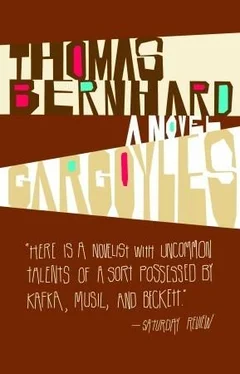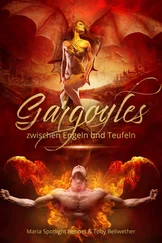The fact was, he continued, that there are more brutal and criminal types in the country than in the city. “Brutality, like violence, is the very fundament of life in the country. Brutality in the city is nothing compared to the brutality in the country, and the violence in the city is nothing compared to the violence of the country. Crime in the city, urban crime, is nothing compared to crime in the country, rural crime. In fact urban crimes are ridiculous compared to the country kind.”
The innkeeper, he declared, was a born criminal, born to violence. He remained a cattle dealer every moment and in all life situations. “Even though he’s crying now,” my father said, “it’s livestock he’s really crying over. For an innkeeper his wife is nothing but livestock. One day he claps a brutish hand on her and draws her out of the undifferentiated herd of unwed girls and breaks her to his use. An inn like that, like every butcher’s or cattle dealer’s or peasant’s house in this area, is a brutal prison for women. If you keep your ears open, whenever you go about the countryside you hear the women inside their houses crying because their men have beaten them. As I go about, there is hardly a man I see who isn’t repulsive. When I enter one of these houses, I enter an atmosphere of brutality, of violence; I am forever carrying my doctor’s bag into a world of criminals. The people who live under the Glein Alp and under the Kor Alp and in the Kainach and Gröbnitz valleys are perfect specimens of a Styria that for thousands and millions of years has been built on the basest kind of physical abuse.”
But then my father recalled his early visits to the miner’s child in Hüllberg. He described how he was received cordially and bidden good-by just as graciously after he had spent a quarter of an hour there, calmed and reassured. But this did not mean that what he had said about people like the innkeeper applied solely to the more prosperous natives. The Hüllberg parents and their child were exceptional. On the whole “the poor are twice as brutal, base and criminal as anyone else, and the pressures on them to make them so are far greater.”
My father did not speak about the schoolteacher who had been the object of his first call that day — did not speak of him, I thought, because the man had died too soon under his hands, before he could have any idea of him. I thought that the teacher had already been forgotten, for after my father talked about the child and its burns once more, and gave a description of the child’s manner of speech, he reverted to the subject of the innkeeper. The innkeeper was waiting for us in the hospital, my father said, and would have to drive us back to Gradenberg in his wagon before going home. Now he was probably in the morgue. My father had meant to go in with him, but it must have slipped his mind. I imagined that right now the attendants in the morgue were giving the innkeeper his dead wife’s clothing, and sure enough the innkeeper was actually waiting for us, with the woman’s clothes bundled under his arm, at the hospital entrance after we had left the lawyer’s and quickly been to the post office and the bank.
On the way back to Gradenberg my father went over the patients he still had to visit in the course of the day. He mentioned the names Saurau, Ebenhöh, Fochler, and Krainer. Whereas I had already been strongly affected by the things I had experienced in connection with the death of the innkeeper’s wife, my father now no longer showed the slightest fatigue. Sitting beside the innkeeper, who drove the wagon as calmly as if nothing had happened, the two of us pictured, each for himself, the patients still to be visited. Outside Krennhof the innkeeper stopped at a butcher’s and, apologizing, got out to arrange some business matter. While he was gone for a few minutes, my father commented that he had known this fellow from childhood, that only ten years ago he had been still a young man, but now was steadily putting on fat, walked in a disgustingly bowlegged manner of increasing sexual clumsiness, and had become altogether obnoxious. As for the innkeeper’s wife, my father said, each time he visited Gradenberg he had found the woman equally repulsive. When such people had no children, the meaning gradually drained out of their marriage so that it degenerated into something perverse and vicious that was destined to end in abject misery unless some accident, such as this man Grössl’s running amuck, put a stop to it.
Along the last stretch of the road we had to turn to avoid a herd of cattle. At this point the innkeeper spoke up, saying several times that he had not yet grasped what had happened; it was still unreal to him.
When we reached Gradenberg, we saw a crowd gathered in front of the inn. The judicial commission had just arrived on the scene. As I got down from the wagon, I noticed curiosity-seekers all over the place, some standing nearby, some at a remove.
My father told me to wait in front of the inn. He strode rapidly inside to confer with the judicial commission, whose members were assembled in the public room. The inn was filled from top to bottom with officials who were murmuring steadily among themselves. In an open window on the second floor, the bedroom window, I noticed the heads of two constables. I paced back and forth in front of the inn until my father came out with the innkeeper, who was to drive us home. All the miners who had witnessed the killing had been summoned to testify. It was Saturday; the mine was closed. Most of them could no longer reconstruct the incident; they made contradictory statements; but two of them had seen Grössl when he knocked the innkeeper’s wife down. That was enough for them. Despite my father’s prediction, Grössl was still at large. Probably, my father said, he was hiding somewhere in the immediate vicinity. Everyone thought it unlikely that he could escape to any great distance, even though he had enough money to have even fled the country.
Back home, we got into our car at once. “We’re driving to Stiwoll,” my father said.
The road from Graden to Kainach was blocked, partly on account of Grössl. But since we were recognized, we were allowed to pass. A case like Grössl’s was naturally a sensation, and the whole region was agog. Everyone was excited by the death of the innkeeper’s wife. The news had spread rapidly through the constabulary headquarters, as we noticed especially in Afling, where we stopped at my uncle’s. My father had brought medicines for my uncle’s wife. We entered the house and called, went down to the lower rooms and into the kitchen, and found that there was not a soul in the unlocked house. My father deposited the medicines on the kitchen cupboard, left a note, and we took our leave.
A year before my mother’s death, my father said, he had been in Afling with her, at the funeral of one of his old classmates, and she had talked constantly about her own impending death. Whereas he had as yet discovered no signs of her fatal disease, she was already permeated by it; that was something he realized only much later. After that visit in Afling he had observed a mysterious and total transformation in her, which baffled him as a physician. There was an increasing melancholia that gradually infected all of us. He recalled every one of the things she had said, could see the road they had walked on before and after the funeral. It had been this time of year, the end of September. Everything connected with that funeral in Afling was still remarkably distinct to him. Especially on fair days, when the air has a particular transparency and nature is lovely for its tranquility alone, one sorrows for the dead with redoubled force.
The essential elements of a person, my father said, come to light only when we must regard him as lost to us, when everything he has done seems to have been a taking leave of us. Suddenly the true nature of everything about him that was merely preparation for his ultimate death becomes truly visible.
Читать дальше












